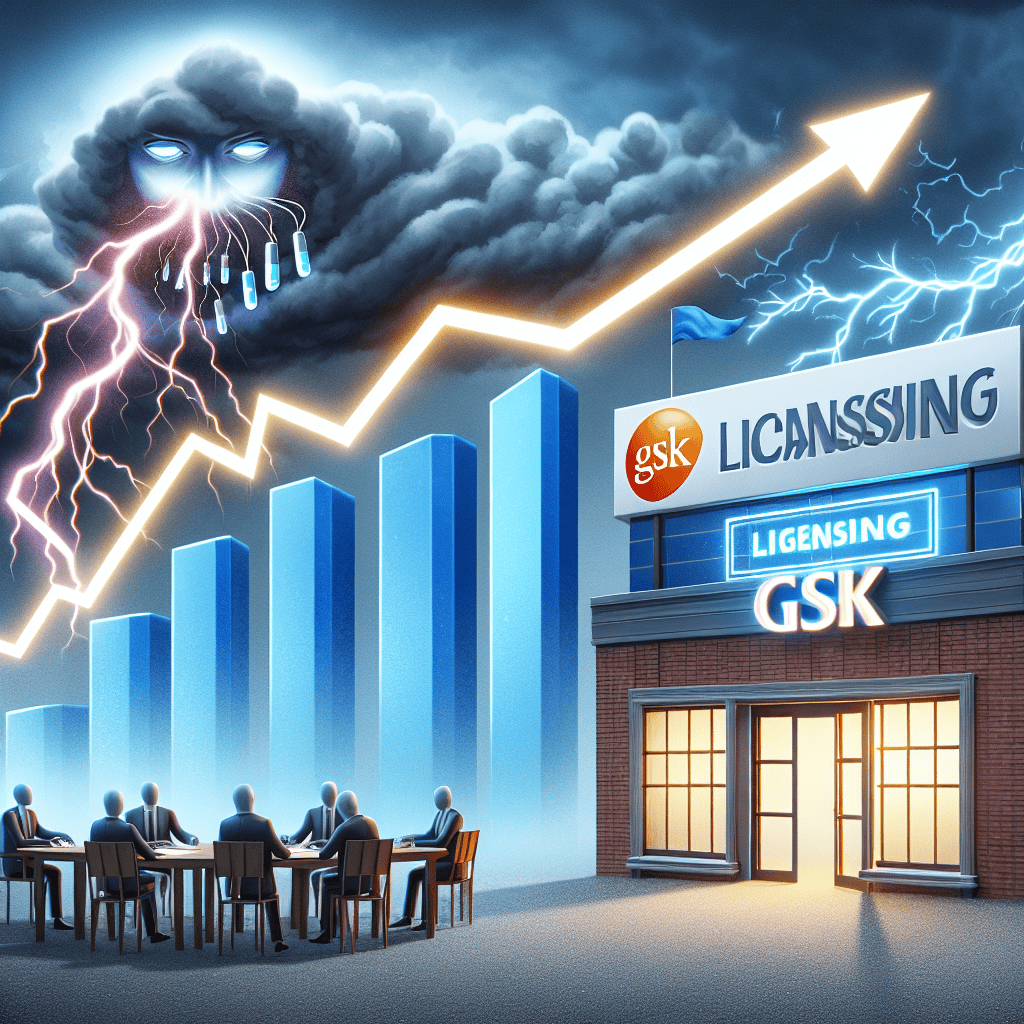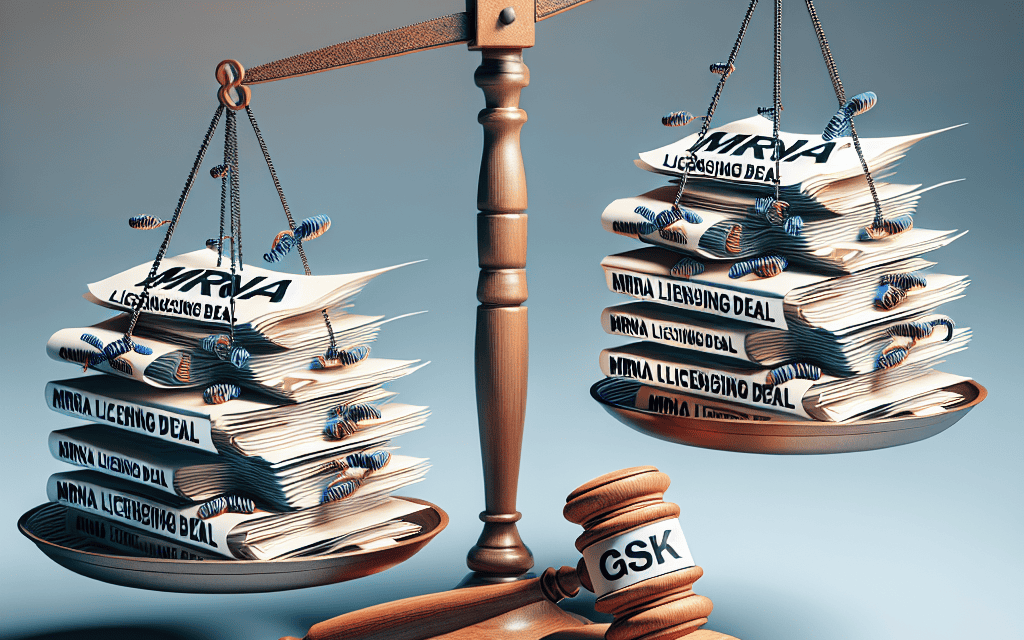“Amid GSK’s Legal Storms, mRNA Licensing Deals Surge Forward”
Introduction
In recent months, the pharmaceutical landscape has witnessed a notable surge in mRNA licensing deals, a trend that coincides with intensifying legal battles faced by GlaxoSmithKline (GSK). As the demand for innovative mRNA technology continues to rise, driven by its pivotal role in the development of COVID-19 vaccines, companies are increasingly seeking strategic partnerships to bolster their research and development capabilities. This surge in licensing agreements reflects the industry’s recognition of mRNA’s transformative potential in treating a wide array of diseases beyond infectious ones, including cancer and genetic disorders. Meanwhile, GSK finds itself embroiled in a series of legal challenges that threaten to impact its market position and strategic direction. These legal battles, centered around patent disputes and competitive pressures, underscore the high-stakes environment in which pharmaceutical giants operate, as they strive to maintain their foothold in a rapidly evolving sector.
Impact Of mRNA Licensing Deals On The Pharmaceutical Industry
The pharmaceutical industry is witnessing a significant shift as mRNA licensing deals surge, a development that is reshaping the landscape of drug development and commercialization. This trend is occurring against the backdrop of intensifying legal battles involving GlaxoSmithKline (GSK), a major player in the pharmaceutical sector. The rise in mRNA licensing agreements is not only indicative of the growing recognition of mRNA technology’s potential but also highlights the strategic maneuvers companies are employing to navigate the complex legal and competitive environment.
mRNA technology, which gained prominence with the rapid development of COVID-19 vaccines, is now being explored for a wide range of therapeutic applications, including cancer, infectious diseases, and genetic disorders. The technology’s ability to instruct cells to produce specific proteins makes it a versatile tool for developing targeted therapies. As a result, pharmaceutical companies are increasingly entering into licensing agreements to access mRNA platforms and expertise, thereby accelerating their research and development efforts. These deals often involve collaborations between established pharmaceutical giants and innovative biotech firms, creating a symbiotic relationship that leverages the strengths of both parties.
The surge in mRNA licensing deals can be attributed to several factors. Firstly, the success of mRNA vaccines during the pandemic has validated the technology’s potential, prompting companies to invest in its further development. Secondly, the competitive pressure to innovate and bring new therapies to market has intensified, driving companies to seek external partnerships to bolster their pipelines. Moreover, the regulatory environment has become more favorable, with agencies like the FDA showing increased willingness to expedite the approval process for mRNA-based therapies, thus reducing the time to market.
However, the rise in mRNA licensing deals is not without its challenges. The legal landscape surrounding mRNA technology is complex, with numerous patents and intellectual property rights at play. GSK, for instance, is embroiled in legal battles over mRNA patents, which have significant implications for the industry. These disputes underscore the importance of securing robust intellectual property rights and highlight the potential risks associated with mRNA licensing agreements. Companies must navigate these legal intricacies carefully to avoid costly litigation and ensure the successful commercialization of their products.
Furthermore, the financial implications of mRNA licensing deals are substantial. These agreements often involve significant upfront payments, milestone payments, and royalties, which can strain the financial resources of smaller biotech firms. However, they also provide these companies with much-needed capital to advance their research and development efforts. For larger pharmaceutical companies, these deals represent a strategic investment in cutting-edge technology that can yield substantial returns if successful.
In conclusion, the surge in mRNA licensing deals is having a profound impact on the pharmaceutical industry, driving innovation and collaboration while also presenting legal and financial challenges. As companies continue to explore the potential of mRNA technology, the industry is likely to see further consolidation and strategic partnerships. The outcome of ongoing legal battles, such as those involving GSK, will play a crucial role in shaping the future of mRNA technology and its commercialization. Ultimately, the ability of companies to navigate these challenges and capitalize on the opportunities presented by mRNA technology will determine their success in this rapidly evolving landscape.
GSK’s Legal Challenges And Their Influence On mRNA Technology
In recent years, the pharmaceutical landscape has been significantly reshaped by the advent of mRNA technology, a transformative approach that has gained prominence due to its pivotal role in developing COVID-19 vaccines. Amidst this backdrop, GlaxoSmithKline (GSK), a major player in the pharmaceutical industry, finds itself navigating a complex web of legal challenges that are influencing its strategic decisions, particularly in the realm of mRNA technology. As GSK grapples with these legal battles, there has been a notable surge in mRNA licensing deals, reflecting a broader industry trend towards collaboration and innovation.
GSK’s legal challenges primarily stem from patent disputes and regulatory scrutiny, which have intensified in recent months. These legal battles are not only costly but also divert resources and attention away from research and development efforts. Consequently, GSK has been compelled to reassess its strategic priorities, leading to an increased focus on mRNA technology as a potential avenue for growth and innovation. This shift is underscored by the company’s recent flurry of licensing deals, which aim to bolster its mRNA capabilities and secure a competitive edge in this rapidly evolving field.
The surge in mRNA licensing deals is indicative of a broader industry trend, as pharmaceutical companies recognize the immense potential of mRNA technology beyond COVID-19 vaccines. This technology offers a versatile platform for developing a wide range of therapeutics, including vaccines for infectious diseases, cancer treatments, and personalized medicine. By entering into licensing agreements, companies like GSK can leverage the expertise and intellectual property of smaller biotech firms, accelerating the development of mRNA-based therapies and expanding their product pipelines.
Moreover, these licensing deals serve as a strategic response to the legal challenges faced by GSK. By diversifying its portfolio and investing in cutting-edge technology, GSK aims to mitigate the risks associated with its ongoing legal battles. This approach not only enhances the company’s resilience but also positions it as a leader in the mRNA space, where innovation and collaboration are key drivers of success. Furthermore, these deals reflect a growing recognition of the importance of partnerships in the pharmaceutical industry, as companies seek to pool resources and expertise to overcome complex scientific and regulatory hurdles.
In addition to addressing immediate legal and strategic concerns, GSK’s focus on mRNA technology aligns with broader industry trends towards personalized medicine and precision therapeutics. As the healthcare landscape continues to evolve, there is an increasing demand for treatments that are tailored to individual patients’ needs. mRNA technology, with its ability to rapidly produce customized therapies, is well-suited to meet this demand, offering new opportunities for companies like GSK to innovate and differentiate themselves in a competitive market.
In conclusion, the intensifying legal battles faced by GSK have prompted a strategic pivot towards mRNA technology, as evidenced by the surge in licensing deals. This shift not only addresses the immediate challenges posed by patent disputes and regulatory scrutiny but also positions GSK at the forefront of a transformative technological wave. As the pharmaceutical industry continues to embrace mRNA technology, the importance of collaboration and innovation cannot be overstated. For GSK, these licensing deals represent a crucial step towards securing its future in a rapidly changing landscape, where the ability to adapt and innovate is paramount.
The Future Of mRNA Vaccines Amidst Rising Licensing Agreements
The landscape of mRNA vaccines is undergoing a significant transformation, marked by a surge in licensing deals that could reshape the future of this groundbreaking technology. This shift comes at a time when GlaxoSmithKline (GSK), a major player in the pharmaceutical industry, is embroiled in intensifying legal battles over mRNA technology patents. As these legal challenges unfold, they are prompting a reevaluation of strategies among pharmaceutical companies, leading to an increase in collaborative agreements and licensing deals.
The rise in mRNA licensing agreements can be attributed to several factors. Firstly, the success of mRNA vaccines in combating the COVID-19 pandemic has demonstrated the potential of this technology to address a wide range of infectious diseases. This has spurred interest from both established pharmaceutical companies and emerging biotech firms, eager to harness the power of mRNA for new therapeutic applications. Consequently, companies are seeking to secure access to mRNA technology through licensing agreements, which offer a more efficient and less risky path to market entry compared to developing the technology independently.
Moreover, the legal battles faced by GSK highlight the complex patent landscape surrounding mRNA technology. As GSK defends its intellectual property rights, other companies are becoming increasingly aware of the potential legal hurdles they may encounter. This awareness is driving a trend towards licensing agreements, as companies aim to mitigate the risk of costly and protracted legal disputes. By entering into licensing deals, companies can gain access to essential mRNA technology while avoiding the pitfalls of patent litigation.
In addition to mitigating legal risks, licensing agreements offer several strategic advantages. They enable companies to leverage the expertise and resources of established mRNA technology developers, accelerating the development and commercialization of new vaccines and therapeutics. This collaborative approach not only reduces the time and cost associated with bringing new products to market but also fosters innovation by combining the strengths of different organizations. As a result, licensing deals are becoming an increasingly attractive option for companies looking to expand their mRNA portfolios.
Furthermore, the growing interest in mRNA technology is not limited to infectious diseases. Researchers are exploring its potential applications in areas such as cancer immunotherapy, personalized medicine, and rare genetic disorders. This broadening scope of mRNA technology is driving demand for licensing agreements, as companies seek to capitalize on emerging opportunities in these fields. By securing access to mRNA technology through licensing deals, companies can position themselves at the forefront of innovation in these rapidly evolving areas.
As the mRNA landscape continues to evolve, the implications of this surge in licensing deals are far-reaching. For one, they signal a shift towards a more collaborative and interconnected pharmaceutical industry, where companies work together to overcome challenges and drive innovation. Additionally, the increase in licensing agreements may lead to a more competitive market, as more players gain access to mRNA technology and develop new products. This competition could ultimately benefit consumers, as it may result in a wider range of mRNA-based vaccines and therapeutics becoming available.
In conclusion, the surge in mRNA licensing deals amidst GSK’s legal battles underscores the growing importance of collaboration and strategic partnerships in the pharmaceutical industry. As companies navigate the complex patent landscape and seek to capitalize on the potential of mRNA technology, licensing agreements are emerging as a key strategy for success. This trend is likely to shape the future of mRNA vaccines and therapeutics, driving innovation and expanding the possibilities for this transformative technology.
How mRNA Licensing Deals Are Shaping Global Health Strategies

The landscape of global health strategies is undergoing a significant transformation, driven in part by the surge in mRNA licensing deals. This shift is occurring against the backdrop of intensifying legal battles involving pharmaceutical giant GlaxoSmithKline (GSK), which have brought renewed attention to the strategic importance of mRNA technology. As the world continues to grapple with the challenges posed by infectious diseases, the role of mRNA technology in vaccine development and therapeutic applications has become increasingly prominent. Consequently, licensing agreements have emerged as a crucial mechanism for facilitating the widespread adoption and implementation of this groundbreaking technology.
In recent years, mRNA technology has proven to be a game-changer in the field of vaccine development, most notably with the rapid creation and deployment of COVID-19 vaccines. This success has spurred a wave of interest and investment in mRNA research, leading to a proliferation of licensing deals. These agreements are not only enabling the dissemination of mRNA technology across different regions but are also fostering collaborations between established pharmaceutical companies and emerging biotech firms. By leveraging the expertise and resources of multiple stakeholders, these partnerships are accelerating the development of new vaccines and therapeutics, thereby enhancing global health preparedness and response capabilities.
However, the surge in mRNA licensing deals is not occurring in isolation. It is closely intertwined with the legal challenges faced by GSK, which have highlighted the complexities and competitive dynamics of the pharmaceutical industry. As GSK navigates its legal battles, other companies are seizing the opportunity to expand their mRNA portfolios through strategic licensing agreements. This trend underscores the growing recognition of mRNA technology as a vital component of future health strategies, prompting companies to secure access to this innovative platform.
Moreover, the intensification of GSK’s legal battles has underscored the importance of intellectual property rights in the pharmaceutical sector. As companies vie for dominance in the mRNA space, the protection and enforcement of patents have become critical considerations. Licensing deals offer a pragmatic solution, allowing companies to circumvent potential legal disputes while still benefiting from the technological advancements of their competitors. This approach not only mitigates the risk of costly litigation but also promotes a more collaborative and inclusive environment for innovation.
In addition to addressing legal and competitive challenges, mRNA licensing deals are playing a pivotal role in shaping global health strategies by facilitating equitable access to life-saving technologies. By enabling the transfer of mRNA technology to regions with limited research and manufacturing capabilities, these agreements are helping to bridge the gap between high-income and low-income countries. This is particularly important in the context of global health emergencies, where timely access to effective vaccines and treatments can mean the difference between containment and widespread transmission.
Furthermore, the strategic deployment of mRNA technology through licensing deals is fostering a more resilient and adaptable global health infrastructure. By diversifying the sources of vaccine and therapeutic production, countries can reduce their reliance on a limited number of suppliers, thereby enhancing their ability to respond to future health crises. This approach not only strengthens national health systems but also contributes to a more robust and coordinated global response to emerging threats.
In conclusion, the surge in mRNA licensing deals, set against the backdrop of GSK’s legal battles, is reshaping global health strategies in profound ways. By facilitating the dissemination of mRNA technology, these agreements are driving innovation, promoting equitable access, and enhancing global health resilience. As the world continues to confront complex health challenges, the strategic importance of mRNA licensing deals is likely to grow, underscoring their critical role in shaping the future of global health.
The Role Of Intellectual Property In mRNA Licensing Conflicts
The landscape of mRNA technology has witnessed a significant transformation, particularly in the realm of intellectual property (IP) and licensing agreements. This shift has been propelled by the increasing demand for mRNA-based solutions, especially in the wake of the COVID-19 pandemic. As pharmaceutical companies race to develop and commercialize mRNA vaccines and therapeutics, the role of intellectual property has become more pronounced, serving as both a catalyst for innovation and a source of contention. Notably, the intensifying legal battles involving GlaxoSmithKline (GSK) have underscored the complexities and challenges inherent in mRNA licensing agreements.
Intellectual property rights are crucial in the biotechnology sector, as they provide companies with the legal framework to protect their innovations and secure a competitive edge. In the context of mRNA technology, patents play a pivotal role in safeguarding proprietary methods, formulations, and delivery systems. Consequently, companies are increasingly engaging in licensing deals to access essential IP, thereby facilitating the development and commercialization of mRNA-based products. These agreements often involve complex negotiations, as parties seek to balance the need for collaboration with the desire to protect their own interests.
The surge in mRNA licensing deals can be attributed to several factors. Firstly, the rapid advancement of mRNA technology has created a fertile ground for innovation, prompting companies to seek partnerships that can accelerate product development. Secondly, the global demand for mRNA vaccines and therapeutics has heightened the urgency for companies to secure access to critical IP. This has led to a proliferation of licensing agreements, as firms aim to leverage each other’s strengths and capabilities. However, as the number of deals increases, so too does the potential for disputes, particularly when it comes to the interpretation and enforcement of IP rights.
GSK’s ongoing legal battles exemplify the challenges associated with mRNA licensing agreements. The company has been embroiled in a series of high-profile disputes over patent rights, highlighting the contentious nature of IP in this rapidly evolving field. These legal conflicts often revolve around the scope and validity of patents, as well as allegations of infringement. As GSK and its competitors vie for dominance in the mRNA space, the resolution of these disputes will have far-reaching implications for the industry as a whole.
Moreover, the intensification of legal battles underscores the need for clearer guidelines and frameworks to govern mRNA licensing agreements. As the technology continues to evolve, so too must the legal and regulatory landscape. Policymakers and industry stakeholders must work collaboratively to establish standards that promote innovation while ensuring fair competition. This includes addressing issues such as patent thickets, which can stifle innovation by creating barriers to entry for new players.
In conclusion, the surge in mRNA licensing deals reflects the growing importance of intellectual property in the biotechnology sector. While these agreements have the potential to drive innovation and collaboration, they also present significant challenges, particularly in terms of legal disputes. As exemplified by GSK’s ongoing legal battles, the resolution of these conflicts will be critical in shaping the future of mRNA technology. Moving forward, it is imperative that stakeholders work together to develop a robust and equitable framework for mRNA licensing, one that balances the interests of all parties involved and fosters a thriving ecosystem for innovation.
GSK’s Legal Battles: A Catalyst For mRNA Innovation?
The recent surge in mRNA licensing deals has captured the attention of the pharmaceutical industry, particularly as GlaxoSmithKline (GSK) finds itself embroiled in a series of legal battles. These developments have raised questions about whether GSK’s legal challenges are inadvertently acting as a catalyst for innovation in the mRNA sector. As the landscape of pharmaceutical research and development continues to evolve, the intersection of legal disputes and scientific advancement presents a complex dynamic that warrants closer examination.
GSK, a prominent player in the global pharmaceutical arena, has been facing intensified legal scrutiny over patent disputes and intellectual property rights. These legal battles, while challenging for the company, have coincided with a notable increase in mRNA licensing agreements across the industry. This trend suggests that other pharmaceutical companies are seizing the opportunity to advance their mRNA technologies, potentially capitalizing on the uncertainty surrounding GSK’s legal standing. As a result, the mRNA sector is experiencing a wave of innovation, driven in part by the strategic maneuvers of companies seeking to strengthen their positions in the market.
The rise in mRNA licensing deals can be attributed to several factors, including the growing recognition of mRNA technology’s potential to revolutionize medicine. The success of mRNA-based COVID-19 vaccines has demonstrated the technology’s efficacy and versatility, prompting pharmaceutical companies to explore its applications beyond infectious diseases. In this context, the legal challenges faced by GSK may have inadvertently accelerated the pace of mRNA innovation, as companies seek to diversify their portfolios and reduce reliance on traditional drug development pathways.
Moreover, the legal battles involving GSK have underscored the importance of securing robust intellectual property rights in the competitive pharmaceutical landscape. As companies navigate the complexities of patent law, they are increasingly turning to licensing agreements as a strategic tool to access cutting-edge mRNA technologies. These agreements not only facilitate collaboration and knowledge sharing but also enable companies to mitigate the risks associated with potential legal disputes. Consequently, the surge in mRNA licensing deals reflects a broader industry trend towards collaboration and open innovation, driven by the need to stay ahead in a rapidly evolving market.
In addition to fostering innovation, the increase in mRNA licensing deals has significant implications for the future of healthcare. By expanding the range of mRNA-based therapies under development, these agreements have the potential to address unmet medical needs and improve patient outcomes. As more companies invest in mRNA research, the likelihood of breakthroughs in areas such as cancer treatment, personalized medicine, and rare diseases increases. This, in turn, could lead to a paradigm shift in how diseases are treated and managed, offering new hope to patients worldwide.
In conclusion, while GSK’s legal battles present significant challenges for the company, they may also be serving as a catalyst for innovation in the mRNA sector. The surge in mRNA licensing deals highlights the pharmaceutical industry’s adaptability and resilience in the face of legal and scientific uncertainties. As companies continue to navigate this complex landscape, the potential for mRNA technology to transform healthcare remains a compelling prospect. Ultimately, the interplay between legal challenges and scientific advancement will continue to shape the future of the pharmaceutical industry, driving progress and innovation in ways that were previously unimaginable.
Strategic Partnerships In mRNA Technology: Lessons From GSK’s Legal Struggles
The landscape of mRNA technology is rapidly evolving, marked by a surge in strategic licensing deals that reflect the growing importance of this innovative field. As pharmaceutical companies seek to harness the potential of mRNA for a variety of therapeutic applications, the industry is witnessing a wave of collaborations aimed at accelerating research and development. This trend is particularly evident in the wake of intensified legal battles faced by GlaxoSmithKline (GSK), a major player in the pharmaceutical sector. These legal challenges underscore the complexities and competitive nature of the mRNA landscape, prompting companies to adopt strategic partnerships as a means to navigate the intricate web of intellectual property rights and technological advancements.
In recent years, mRNA technology has emerged as a transformative force in the development of vaccines and therapeutics, most notably demonstrated by the success of COVID-19 vaccines. This success has spurred a flurry of activity in the sector, with companies eager to capitalize on the technology’s potential to address a wide range of diseases. Consequently, licensing deals have become a strategic tool for companies to access cutting-edge mRNA platforms and expertise, enabling them to expand their pipelines and enhance their competitive edge. These partnerships not only facilitate the sharing of knowledge and resources but also mitigate the risks associated with the high costs and uncertainties of drug development.
GSK’s ongoing legal battles highlight the challenges that companies face in protecting their intellectual property while fostering innovation. The disputes, which revolve around patent rights and proprietary technologies, have drawn attention to the need for clear and robust legal frameworks to govern the use of mRNA technology. As GSK navigates these legal complexities, other companies are taking note, recognizing the importance of securing strategic alliances to bolster their positions in the market. By entering into licensing agreements, companies can leverage each other’s strengths, access new markets, and accelerate the development of novel mRNA-based therapies.
Moreover, the intensifying competition in the mRNA space has prompted companies to adopt a more collaborative approach, recognizing that partnerships can drive innovation and create synergies that benefit all parties involved. This shift towards collaboration is evident in the increasing number of cross-industry partnerships, where pharmaceutical companies team up with biotech firms, academic institutions, and research organizations. These alliances are instrumental in advancing the science of mRNA, facilitating the translation of research into clinical applications, and ultimately bringing new treatments to patients more efficiently.
In light of GSK’s legal struggles, there are valuable lessons to be learned about the strategic management of intellectual property and the importance of fostering a collaborative ecosystem. Companies must navigate the delicate balance between competition and cooperation, ensuring that they protect their innovations while also engaging in partnerships that drive progress. As the mRNA field continues to evolve, the ability to form strategic alliances will be a critical factor in determining success.
In conclusion, the surge in mRNA licensing deals reflects a broader trend towards strategic partnerships in the pharmaceutical industry. As companies seek to capitalize on the potential of mRNA technology, they are increasingly turning to collaborations as a means to overcome legal challenges, accelerate innovation, and enhance their competitive positions. The lessons learned from GSK’s legal battles underscore the importance of strategic alliances in navigating the complex and rapidly evolving mRNA landscape, ultimately paving the way for the development of groundbreaking therapies that have the potential to transform healthcare.
Q&A
1. **What is the main focus of the recent surge in mRNA licensing deals?**
The main focus is on expanding the development and application of mRNA technology across various therapeutic areas, driven by its success in COVID-19 vaccines.
2. **Why are companies interested in mRNA technology?**
Companies are interested in mRNA technology due to its potential for rapid development, scalability, and versatility in targeting a wide range of diseases.
3. **How has the success of COVID-19 vaccines influenced mRNA licensing deals?**
The success of COVID-19 vaccines has demonstrated the effectiveness and potential of mRNA technology, leading to increased interest and investment in licensing deals.
4. **What challenges is GSK facing that relate to mRNA technology?**
GSK is facing legal battles over patent rights and intellectual property related to mRNA technology, which could impact its strategic positioning in the market.
5. **How are legal battles affecting GSK’s business strategy?**
Legal battles are forcing GSK to reassess its business strategy, potentially leading to increased focus on securing licensing deals and partnerships to strengthen its mRNA portfolio.
6. **What impact do these legal battles have on the broader mRNA market?**
These legal battles highlight the competitive and contentious nature of the mRNA market, potentially influencing other companies to secure their own licensing agreements to avoid similar disputes.
7. **What is the potential future of mRNA technology in the pharmaceutical industry?**
The potential future of mRNA technology in the pharmaceutical industry includes its application in personalized medicine, cancer treatments, and other infectious diseases, with ongoing research and development expected to expand its uses.
Conclusion
The surge in mRNA licensing deals amid intensifying legal battles for GSK highlights a strategic pivot within the pharmaceutical industry towards innovative biotechnologies. As GSK faces mounting legal challenges, the increased focus on securing mRNA technology licenses underscores the growing recognition of mRNA’s potential in developing advanced therapeutics and vaccines. This trend reflects a broader industry movement to capitalize on mRNA’s versatility and efficacy, potentially reshaping competitive dynamics and accelerating the development of next-generation medical solutions. The legal pressures on GSK may further drive the urgency and volume of these deals, as companies seek to bolster their portfolios and mitigate risks associated with traditional pharmaceutical approaches.





